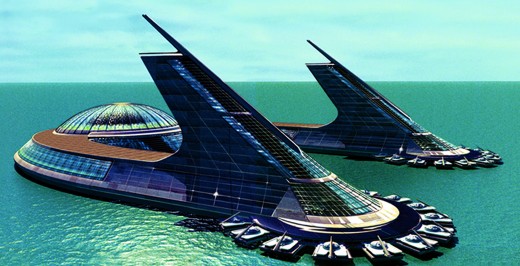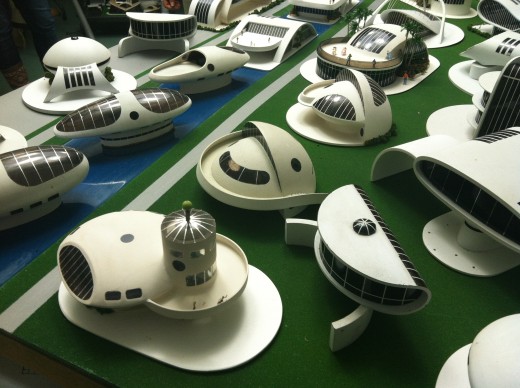Utopia and the Golden Corral
Lori Colleen Kelly & Felecia Chizuko Carlisle

We were ushered into our curvilinear meeting place, served cookies and lemonade, and handed books. Jacque Fresco appeared on the couch and proceeded to give a lecture on what it means to be a Futurist Social Engineer.
Yes, THE FUTURE is the place to which we have yet to arrive. Jacque Fresco has a plan for it: a future society, a future city, what it looks like and how it works. On his land scale models are made, educational videos produced, high-tech materials chosen. He has visualized the future, written about it, talked and talked and talked about it, for almost a century.

Rendering courtesy The Venus Project
The structures on his land recall the domes of Buckminster Fuller and his ideas seem to capture some of the essence of Bucky’s teachings. Fresco admires Fuller’s work and perceives him as a peer, but claims no stake in it. His own ideas regarding design are not necessarily founded in architecture, but in necessity. His buildings appear the way they do because they need to. A rounded shape is the best shape to build on the ocean. It makes sense to make parts that are collapsible, to mold standardized sections out of lightweight material, to use metals that can be folded for shipping, and then heated to expand into their original shape.
In Fresco’s future, floating cities will be erected where Florida used to be. He has the plans and the models. As if in a museum, hundreds of maquettes cover every flat surface inside two of the dome buildings at The Venus Project. Tall spires sprout spherical housing pods. Streamlined airplanes, and zero-drag cars stand ready to be featured in the many dioramic stages for filming promotional materials that are scattered around the property.

Models for the future. Photo: Authors
According to Fresco, the plan for our future is resource based. Money will be eliminated, all resources will be shared, and centralized computers will make equitable fact-based allocations. There will be no investors, only scientists and citizens who will be taught to value knowledge over excess. There is no shopping mall. There is no fancy anything. Engineers would be the leaders in society. Not banks, not politicians, and certainly not kings.
Fresco refuses any identification as an idealist, environmentalist, or dogmatist, and he rejects utopianism. He truly believes in pure science and common sense and the usefulness of their applications. Fresco believes that following the logic of scientific fact will solve all of our social, political, and economic problems, including everyday issues. “In the future we will measure each person’s eyesight and lamps will be engineered to provide the proper light, not some useless look.” If human beings can be taught the facts, they won’t need nothings like style or fashion.
Facts, proof, measured plans: these are the positivist planks on which Fresco builds his future cities. But before humans are ready, they must be taught to see past the delusions formed by their culture.
For Fresco words are suspect. “Everything I learned in school is bullshit.” Religion, aesthetics, politics—they are all delusions. “Will, consciousness, awareness, philosophy, hope, poetics, art, courage, freedom, democracy, individuality—all words with no meaning.” They are nothing things.
This is why Fresco needs capitalism to collapse before he can implement his plan—a plan based on science, peace, and the elimination of poverty, all stuff he writes about in The Best That Money Can’t Buy: Beyond Politics, Poverty, and War. It’s no wonder he hasn’t been funded. It’s hard to run a Kickstarter campaign for the elimination of money.
Until the collapse of capitalism, Fresco and Meadows have used their weekends and cash from their day jobs to build Venus over the past 20 years. They’ve dug their own winding river out of the wetlands in Central Florida. He designed the wire-framed domes and she hand-plastered them, one bucket at a time, experimenting along the way with different mixes of material. Some appear like stagnant boats. Others have a heavier concrete feel. What was once the swimming pool has gone green with algae. This place that they are residing in is not the place they want to create. It is a research facility and a think tank for the future. Musty air circulates when Roxanne flips on the window AC unit in the dome.
But after years of only one or two visitors straggling through, the Venus Project is now booking bi-monthly tours with guests from all over the world. Just what is the appeal?
Perhaps Fresco’s time has come. Legitimate scholarly journals have linked his designs to the hydro-engineering projects of the Netherlands as alternatives for our future water world. As Florida sinks into the ocean, his floating cities could be welcome additions to our sodden skylines. Their sky-high spires are already popping up in Miami whackitect projects like Miapolis, a proposal by Kobi Karp Architecture, that promises to solve all of our problems, while making us sexier. The advertisement reads:
“Here in beautiful Miami, Florida, rising out of the sand and surf, Miapolis… it will take your breath away… A destination like no other that will redefine how cities are conceived.” Miapolis “will be a self-sufficient development, providing the highest technology in alternative energy usage, including solar, wind, water desalinization and reclamation, along with waste management. “
While Miapolis promises increases in real-estate value for the rich, Fresco puts monetary value on nothing. The world is not to be bought, sold, and traded within a resource-based economy. Instead of “winners” the Venus Project attracts “seekers,” people that are looking for truth and integrity.
People don’t fly half way around the world and pay $200 to sit at the feet of engineers. After five straight hours of talking, when Fresco opens the floor for questions no one on our tour asks about carrying capacity, or tensile strength. Instead, the pale kid from Copenhagen asks, “ Do I have my own will?”
This is a question for a guru, not an engineer. But Fresco does not seem to offer the kind of solutions that would appeal to seekers; to Fresco, “Religion is bullshit.”
The yoga pants dude says they should discuss these ideas with his boy Elon Musk but first he needs to know how we are supposed to arrive at Fresco’s version of the future. What tangible things can we do now to move the world beyond politics, poverty and war?
“Nothing” says Fresco. “Nothing.” “We‘ll only change out of desperation, after this world is dead.” Fresco’s answer is that implementing his planned solutions will require collapse; that the world will not change its course until it has to.
When we finally emerged from the dome seven hours later, we were weary, shell-shocked and seriously starving. It was during dinner at the Golden Corral that we began to see the light.
Over his second plate of steak, Ponytail Guy explains, “Jacque has a plan. Jacque has delineated 80-year epochs toward the inevitable breakdown of society. Jacque charted the data and predicted the gas shortage of 1970, and he knew all about this big recession.” Fresco’s measurements and facts provide a sense of surety in a world where words are only subjective interpretations. They help us predict. They offer a possible safe harbor for those who want to believe in the possibility of harmony.
That’s why Ponytail Guy plans to move to Venus, as soon as he can find a job off Craigslist and save up some money. That’s why the statuesque blond couple had driven down from Canada to find an escape from the rat race. That’s why the couple from Pittsburgh put their plans for an aquaponics farm on hold to explore alternatives.
But who determines what counts as fact? Since Thomas Kuhn convinced us that science is an interpretive practice, not a positivist series of neutral experiments on the path toward Truth, we’ve come to see facts as a site of argument and paradigm shift. Who decides what should be measured? The computer may consistently carry out the centralized control program, but who is doing the programming?
Engineering and science cannot escape the agony of politics.
Nor can they escape aesthetics. Fresco may claim that any idea other than measured Truth is a “nothing thing.” But the appeal of his model cities would be gutted without their retro futurist kitsch, their blue and white Jetsons hues, and rounded womb-like shapes. Rationally planned, economically equitable, these are worthy attributes. But are they human? As we line up for our third helping of Golden Corral goodness we have to wonder, will we ever be willing to dam the never-ending river of chocolate for the sake of rational caloric intake?
A final message from Jacque:
“The way we are living right now is a mad rush, a stampede; this pollution of mind and body is stagnation, not evolution. Money cannot warm a heart or enrich the mind. All recognize the heedless waste of planned obsolescence and monetary greed. And yet, it need not be so. With even the slightest action, you will be so amazed at just how little is needed to enact a change. You are all very special, every human on this planet is so special, so aren’t we all deserving of something better, to live without fear or undue strife? As much as the water we drink, as much as the air we breathe, as much as the sun, which shines down, now more than ever, we need each other to survive. Nothing will change unless we want something better for ourselves. The day your child comes to you, asking, “Why can’t we live in a real home, why can’t we have food to eat?” It will be sooner than you think if we cannot act together. Listen, and hear. Our future is in our hands, hearts and minds. Let’s make it happen. Let’s come together and save our world, save each other, and save our future from ourselves.”
Fanaticism or fact? The future lies somewhere between.










